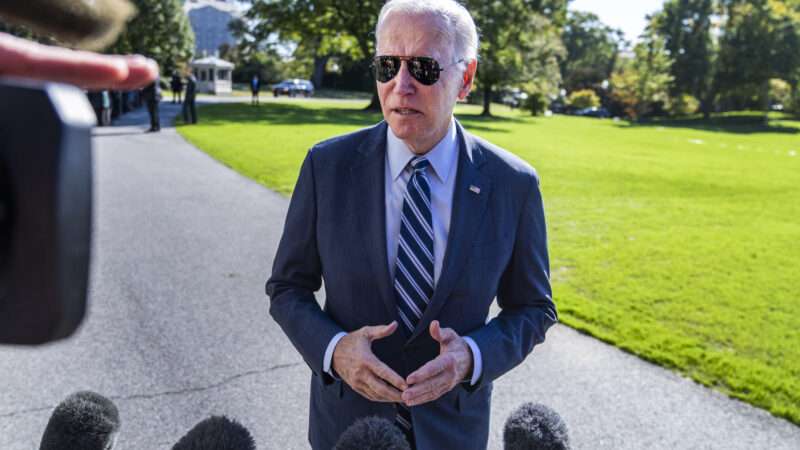
Just four days ago, the Biden administration launched a new line of attack against former President Donald Trump and his campaign trail promise to hike tariffs if he is elected in November.
Those higher tariffs would be "inflation-feeding welfare for the rich" that would raise prices for consumers, according to an Axios summary of a White House memo. The shift in messaging, The New York Times reported, was an attempt at "recalibrating" Biden's economic message in the face of stubbornly high inflation and the persistent sense among voters that the economy is not doing well. In effect, this is an attempt to remind voters that Trump's economic plans include the deliberate goal of artificially inflating prices—because that's what tariffs do.
On Wednesday, President Joe Biden called for hiking tariffs.
During a visit to visit today the United Steelworkers union headquarters in Pittsburgh, Pennsylvania, Biden said he would move to "triple the tariff rate on both steel imports and aluminum imports from China" if a new Commerce Department investigation finds that China is selling steel to America at what Biden called "unfair" low prices. Biden also reiterated his opposition to U.S. Steel's purchase by Japan-based Nippon Steel, saying that the American-based firm should remain "American-owned, American-operated."
Earlier in the day, the White House officially announced that it was aiming to triple some existing tariffs on steel and aluminum imported from China, from 7.5 percent to 25 percent. These higher tariffs would be separate (and in addition to) the 25 percent tariffs on steel and 10 percent tariffs on aluminum that then-President Donald Trump imposed in 2017 via a different law that grants presidents the authority to raise tariffs for ostensible "national security" reasons.
With the announcement, Biden has pulled off an impressive set of own goals. Not only does the call for higher tariffs undermine his own campaign's attack on Trump's plans to hike tariffs, but it also underscores Biden's willingness to play favorites with economic policy, seemingly without regard for those who will face higher prices as a result. Remember, higher tariffs meant to protect one industry create higher costs down the supply chain. A promise to raise tariffs to protect steelworkers is a promise to raise prices for industries that use steel, and the past six years have provided a real-life experiment in how that works: the cost of Trump's tariffs was nearly entirely paid by American consumers and downstream industries.
Indeed, if higher tariffs were the solution to anything, wouldn't there be evidence of that by now? American steel and aluminum production has flatlined since Trump's tariffs were imposed six years ago, and America's biggest steelmaking company, U.S. Steel, is up for sale. Trump promised that protectionism was the path to a steelmaking renaissance, and that's clearly not been true—but maybe it'll work if Biden mashes the button a little harder? How does that make sense?
The only positive thing that can be said about Biden's proposal idea is that it's likely to be ineffective because America doesn't import much steel or aluminum from China anymore.
The U.S. imported 25.6 million metric tons of steel in 2023, according to the Census Bureau. China was the source of 553,000 tons of steel last year—which might sound like a lot, but it amounts to merely 2 percent of total imports.
Biden's plan to hike tariffs "would only affect 0.6% of U.S. demand for steel," The Wall Street Journal reported Wednesday afternoon, underscoring just how insignificant this action is likely to be.
Still, the mixed signals being sent by the president matter. He is proposing a change that's likely to be ineffective at accomplishing his stated goals—and to the extent that it does make an impact, the result will be higher prices for American businesses and consumers. Meanwhile, he's pitching that plan to hike prices at the same time that his campaign is trying to get voters to forget about how much they hate inflation, and in the midst of an attack on Trump's plans to do the exact same thing.
It all adds up to an economically foolish, politically lazy attempt to pander to an incredibly narrow slice of the American electorate—unionized steelworkers—by using the presidency's power over trade to influence an election.
Like with Trump's attempts to raise trade barriers for nakedly political reasons, Biden's call for higher tariffs on Chinese steel and aluminum is a good reminder that the president's broad powers over trade policy ought to be curtailed.
The post Biden's Call for More Steel Tariffs Is Economically Ineffective Political Pandering appeared first on Reason.com.







